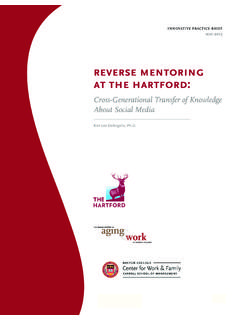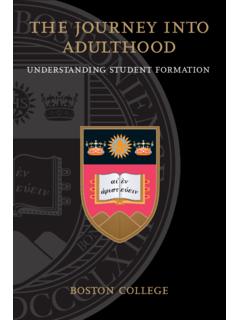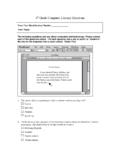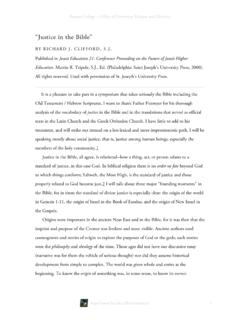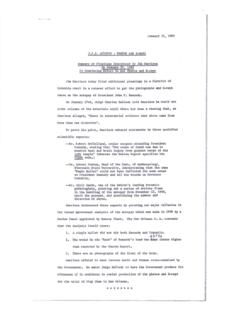Transcription of Catholicism : Introduction
1 CatholicismBY RICHARD MCBRIEN : Introduction Published in Catholicism . 1994 by HarperCollins Publishers. Used with permission of the author. "WHAT IS Catholicism ?" The Meaning of the Word Catholicism is a rich and diverse reality. It is a Christian tradition, a way of life, and a community. That is to say, it is comprised of faith, theologies, and doctrines and is characterized by specific liturgical, ethical, and spiritual orientations and behaviors; at the same time, it is a people, or cluster of peoples, with a particular history. The word Catholic is derived from the Greek adjective, katholikos, meaning "universal," and from the adverbial phrase, kath' holou, meaning "on the whole.
2 " The term was first used by St. Ignatius of Antioch ( ) in his Letter to the Smyrn ans: "Where the bishop is to be seen, there let all his people be; just as wherever Jesus Christ is present, we have the catholic Church" ( ). Ever since the Reformation, the word has commonly been used in opposition to Protestant, but its real opposite is sectarian, which pertains to a part of the Church that has separated itself off from the worldwide Church and, to some extent, from the world itself. Thus, St. Augustine (d. 430) contrasted the separatist and sectarian movements of his time, especially Donatism in North Africa, with the Catholic Church that is both universal and orthodox in its faith.
3 In his letter to Honoratus, a Donatist bishop, he wrote: "Do you happen to know why it should be that Christ should lose his inheritance, which is spread over the whole world, and should suddenly be found surviving only in the Africans, and not in all of them? The Catholic should exist throughout the whole world. Whereas your party, which is called the party of Donatus, does not exist in all those places in which the writings of the apostles, their discourse, and their actions have been current" (Epistle 49, n. 3). Boston College -- Office of University Mission and Cyril of Jerusalem (d.)
4 386) was even more explicit: "The Church is called 'Catholic' because it extends through all the world.. because it teaches universally and without omission all the doctrines which ought to come to human knowledge..because it brings under the sway of true religion all classes of people, rulers and subjects, learned and ignorant; and because it universally treats and cures every type of sin..and possesses in itself every kind of virtue which can be spiritual gifts of every kind" (Catechetical Lectures,18, n. 23). The word Catholic was incorporated into the creeds along with the other notes of the Church: one, holy, and apostolic.
5 It appears in the Creed of Cyril of Jerusalem, the Creed of Epiphanius (d. 403), and in the Nicene-Constantinopolitan Creed (381) that is still recited in the liturgy today. But the use of the word Catholic became divisive after the East-West Schism of the eleventh century and the Protestant Reformation of the sixteenth century. The West claimed for itself the title Catholic Church, while the East, which severed the bond of communion with Rome, appropriated the name Holy Orthodox Church. After the ruptures of the Reformation those in communion with Rome retained the adjective Catholic, while the churches that broke with the papacy were called Protestant.
6 However, some today insist that the adjective Catholic applies also to many other Christians who regard themselves as evangelical, reformed, and Catholic alike. Indeed, the Second Vatican Council (1962-1965) broadened the notion of catholicity to include churches outside the Catholic Church (Dogmatic Constitution on the Church, n. 8), and spoke of them as possessing varying "degrees" of catholicity (Decree on Ecumenism, ). Catholic or Roman Catholic? There is another, still unresolved, aspect to the controversy, however. Are Catholics who are in communion with Rome Roman Catholics or just plain Catholics?
7 Some inside as well as outside the Catholic Church think it ecumenically insensitive to drop the adjective Roman because so many Anglican, Orthodox, Protestant, and Oriental Christians also regard themselves as Catholic. But other Catholics object to the use of the adjective Roman on Boston College -- Office of University Mission and grounds. For such Catholics Roman tends to confuse rather than define the reality of Catholicism . The history of the Church begins with Jesus' gathering of his disciples and with the post resurrection commissioning of Peter to be the chief shepherd and foundation of the Church--but in Jerusalem, not in Rome.
8 Therefore, it is not the Roman primacy that gives Catholicism one of its distinctive marks of identity within the family of Christian churches, but the Petrine primacy. The adjective Roman applies more properly to the diocese, or see, of Rome than to the worldwide Church which is in union with the Bishop of Rome. Indeed, it strikes some Catholics as contradictory to call the Church Catholic and Roman at one and the same time. Eastern-rite Catholics who are in union with Rome (sometimes pejoratively called Uniates) also find the adjective Roman objectionable.
9 They prefer to speak of their churches as Catholic and then to distinguish particular ecclesial traditions within the Catholic communion. In addition to the Latin, or Roman, tradition, there are seven other non-Latin, non- Roman ecclesial traditions: Armenian, Byzantine, Coptic, Ethiopian, East Syrian (Chaldean), West Syrian, and Maronite. Each of these is a Catholic church in communion with the Bishop of Rome; none of these is a Roman Catholic church. Catholicism , therefore, is neither narrowly Roman nor narrowly Western. It is universal in the fullest sense of the word.
10 It should be evident from the title of this book ( Catholicism rather than Roman Catholicism ) which argument the author finds more compelling. To choose one side, however, is not necessarily to reject the other. One can apply the term Catholic to the community of churches in union with Rome without precluding its wider application to Anglicans, Orthodox, Protestants, and Oriental Christians. At the same time, Catholics can reject the adjective Roman without lapsing into ecclesiastical triumphalism. What is important is that each side explain and support the reasons for the position taken.

